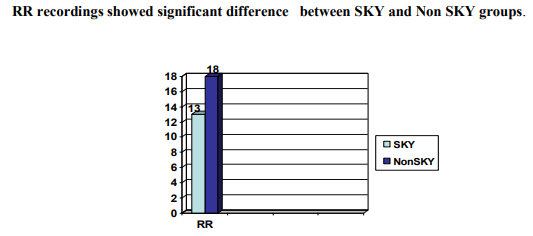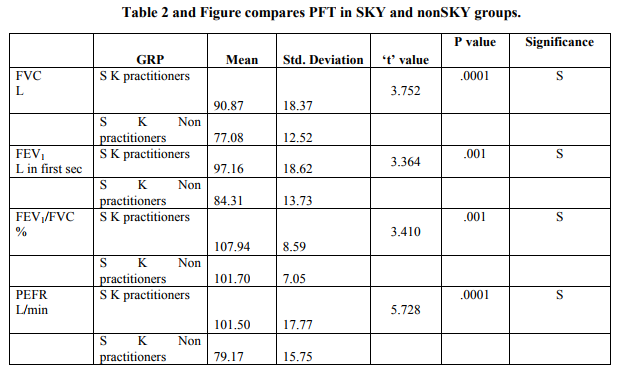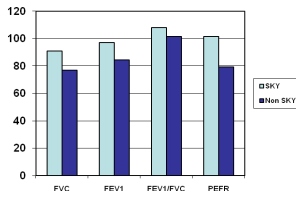IJCRR - 3(11), November, 2011
Pages: 116-120
Print Article
Download XML Download PDF
EFFECT OF SUDARSHANA KRIYA YOGA ON RESPIRATORY SYSTEM
Author: Anupama N, N.Srinivasaragavan, Varun Malhotra, Basavarajaiah
Category: Healthcare
Abstract:Background: Yoga is probably best lifestyle ever devised in the history of mankind. The word YOGA comes from the Sanskrit root ?YUJ? which means to unite. (the union of body with the
soul.) Kriya in Sanskrit means action, most commonly refers to technique or practice with in a
yoga practice. Sudarshana kriya is a unique rhythmical breathing process to eliminate stress and
support the various organ systems with in the body, transform overpowering emotions and
restore peace of mind. Objective: To assess the effects of Sudarshana kriya on respiratory function. Materials and methods: 36 subjects practicing Sudarshana kriya for more than 2 years, who were in the age group of 18-30 years nonsmokers (interviewed using standard
questionnaire), from Art of living ashram, Bengaluru were chosen as test group. 36 subjects
who were not practicing any type of yoga of same age group and non smokers were chosen as
controls. Pulmonary function tests like FVC, FEV1, FEV1/FVC and PEFR results were analysed
using appropriate statistical method. Results: Study group showed significantly higher FVC, FEV1, FEV1/FVC. Suggesting sympathovagal balance. Conclusion: Pulmonary functions
improve significantly with Sudarshana kriya due to respiratory muscle strengthening and good
lung expansion and by harmonizing the central nervous system and our breathing.
Keywords: Sudarshana Kriya yoga, respiratory rate and pulmonary function tests.
Full Text:
INTRODUCTION
Patanjali, foremost exponent of Yoga, describes pranayama as the gradual unforced cessation of breathing. Pranayama is derived from two Sanskrit wordsprana(life) and yama means(control). 1,2,3 Pranayama or control of prana or life force yields heartbeat, pulse and mind control. Sudarshana kriya is a Sanskrit term meaning ?proper vision, purified action?. By ?controlling the breath? it normalizes breathing by concentrating on it systematically. Regular practice of Sudarshana Kriya reduces symptoms of mental depression, 4,5,7 decreases fasting blood glucose levels in type-2 Diabetes Mellites6 and for treating stress and anxiety in post traumatic stress disorder.10 Sudarshana Kriya leaves one more alert aware, attentive and focused.8 Our study is designed to observe the effect of Sudarshana Kriya on pulmonary function tests.
MATERIALS AND METHODS
36 (18 males, 18 females) subjects practicing Sudarshana kriya (SKY) for more than 2 years who were in the age group of 18-30 years, from art of living ashram, Bengaluru were chosen as test group. 36 subjects who were not practicing any type of yoga (nonSKY) of same age group were chosen as controls. The subjects had no history of allergic disorders, respiratory disorders, no history of systemic disease and no history of smoking. The breathing techniques that are part of Sudarshana Kriya are
a) Three-Stage Pranayama with Ujjayi or "Victory Breath"
, b) Three sets of Bhastrika or "Bellow's Breath", and
c) Sudarshana kriya or the "Healing Breath Technique" and they were practiced in that order. The breathing practices are done in a vajrasan posture, on the carpet spread over the floor. Eyes are kept closed throughout the sessions.
Normal breathing is at the rate of 14 to 16 breaths per minute. Ujjayi is a slow and deep breathing technique at 2 to 4 breaths per minute.
Three-Stage Pranayama with Ujjayi breath is an advanced form using a specific ratio of inhalation and exhalation, and breathholds. Participants practice this component where specific arm positions are held for approximately ten minutes in total. It involves taking a breath for a period of 4– 10 seconds, holding the inhaled breath for a further 4–10 seconds, exhaling over a period of 6–12 seconds, and holding one‘s breath in the exhaled The second breathing component of Sudarshana kriya is Bhastrika. Here the breathing is vigorous and faster, about twenty to thirty respiratory cycles per minute. Three approximately one-minute rounds of Bhastrika are followed by a few minutes of normal breathing. Arm movements are used to increase the force and depth of inhalation and exhalation. Practice of this component lasts for approximately five minutes.
The central component of Sudarshana kriya which is an advanced cyclical breathing exercise of slow, medium, and fast rates in succession. Slow breaths are about 20 respiratory cycles per minute, medium breaths are about 40–50 respiratory cycles per minute, and the fast breathing is about 60–80 cycles per minute. The participant rotates through these breathing patterns during Sudarshana kriya. Daily home practice of Sudarshana kriya takes approximately 10 minutes. During the instruction phase, several longer group sessions of Sudarshana kriya, lasting approximately thirty minutes, are practiced. Pulmonary Function Tests like FVC, FEV1, FEV1/FVC and PEFR were measured using Medspiror. The results were analyzed using Z-test to test the statistical significance of difference in the two groups (Table 2)
RESULTS
Pulmonary Function Test values are significantly higher in SKY group indicating better control of breathing, stronger respiratory muscles and overall lower resistance to passage of air during expiration. (Table.1 and Table.2)




DISCUSSION
Sudarshana kriya appears to be specialized pranayamic breathing capable of inducing series of beneficial changes besides causing improvement in respiratory functions. Various respiratory parameters improve after Sudarshana Kriya. A significant increase in FVC, FEV1, FEV1/FVC , PEFR, increase in the vital capacity, tidal volume increase in expiratory and inspiratory pressures, breath holding time and decrease in the respiratory rate. Bhastrika strengthens the diaphragm (due to deep inspiration), expiratory muscles of abdomen transverse abdominus external oblique (due to forceful expiration). Probable explanation for this could be, regular inspiration and expiration of long medium and short durations during Sudarshana Kriya leads to strengthening of respiratory muscles. This helps the lungs to inflate and deflate maximally. This maximum inflation and deflation is an important physiological stimulus for the release of surfactant and prostaglandins increasing the alveolar spaces, thereby increasing lung compliance and decreasing bronchial smooth muscle tone activity.11 A decrease in breathing frequency have shown increase synchronization of brain waves eliciting delta wave activity indicating parasympathetic dominance. Although these mechanisms provide some clues to pranayama‘s mechanism, the neural mechanism that causes this bodywide autonomic shift is not reported. It has been proposed that certain voluntary breathing exercises can modulate the parasympathetic and sympathetic nervous system bringing their levels of activation into a normal range.5 Techniques involving focusing on a single thought resulted in regularity of respiration while in the thoughtless state there was reduction in the rate and regularity of respiration. Sudarshana kriya by long term manipulation of breathing by practicing slow deep breathing likely results in over stretching of pulmonary stretch receptors, increase the lung volumes and capacities. Long term practice results in manipulation of vagal tone, thereby reducing rate of respiration at rest. Voluntary, slow, deep breathing functionally resets the autonomic nervous system through stretch-induced inhibitory signals and hyperpolarization currents propagated through both neural and non-neural tissue which synchronizes neural elements in the heart, lungs, limbic system, and cortex.9 Inhibitory current regulates excitability of nervous tissues and is known to elicit synchronization of neural elements which typically is indicative of a state of relaxation. Synchronization within the hypothalamus and the brain stem is likely responsible for inducing the parasympathetic response during breathing exercises.5 Sudarshana Kriya is understood to use specific rhythms of breath to eliminate stress and support the various organ systems with in the body, transform overpowering emotions and restore peace of mind. 10
References:
1. Sivananda. The Sivananda Yoga Centre. (1983). The book of Yoga. London: Ebury Press. pp14-15.
2. Yogananda, P. (1946). Autobiography of a yogi. Los Angeles: SelfRealization Fellowship. pp 1920-1921.
3. Yogananda, P. Undreamed of possibilities. The teachings of Sri Sri Paramahansa Yogananda. pp 5-6.
4. Janakiramaiah N, Gangadhar BN, Naga Venkatesha Murthy PJ; Antidepressant efficacy of Sudarshan Kriya Yoga (SKY) in melancholia: A randomized comparison with electroconvulsive therapy (ECT) and imipramine. Journal 120 International Journal of Current Research and Review www.ijcrr.com Vol. 03 issue 11 November 2011 of Affective Disorders, 2000; 57(1): 255-259.
5. Naga Venkatesha Murthy PJ, Janakiramaiah N, Gangadhar BN, SubbakrishnaDK; P300 amplitude and antidepressant response to Sudarshan Kriya Yoga (SKY). J Affect Disord, 1998; 50: 45–48.
6. Agte VV, Tarwadi K; Potential of Sudarshan Kriya Yoga practice in treatment of type 2 diabetes. Altern Complement Ther, 2004; 10:220–222.
7. Anette Kjellgren, Sven Å Bood Kajsa Axelsson Torsten Norlanderhttp://www.biomedcentral.co m/logon/logon.asp?msg=ce, Fahri Saatcioglu; Wellness through a comprehensive Yogic breathing program – A controlled pilot trial. BMC Complementary and Alternative Medicine 2007; 7: 43-51.
8. Dr. M. Bhatia EEG during sudarshana Kriya a quantitative analysis. Indian J Physiol Pharmacol. 1998; 50(1): 45-48.
9. Vedamurthachar, A (A); Janakiramaiah, Nimmagadda (N); Hegde, Jayaram M (JM); Shetty, Taranath K (TK); Subbakrishna, D K (DK); Sureshbabu, S V (SV); Gangadhar, B N (BN); Antidepressant efficacy and hormonal effects of Sudarshana Kriya Yoga (SKY) in alcohol dependent individuals. 2006Aug; 94 (1-3): 249-253.
10. Brown RP, Gerbarg L; Sudarshan Kriya Yogic breathing in the treatment of stress, anxiety, and depression: Part II—Clinical applications and guidelines. J Altern Complement Med. 2005; 11: 711–717.
11. Belman MJ, Gaesser GA; Ventilatory muscle training in the elderly. J Appl physiol,1998; 64(3): 899 – 905.
|






 This work is licensed under a Creative Commons Attribution-NonCommercial 4.0 International License
This work is licensed under a Creative Commons Attribution-NonCommercial 4.0 International License